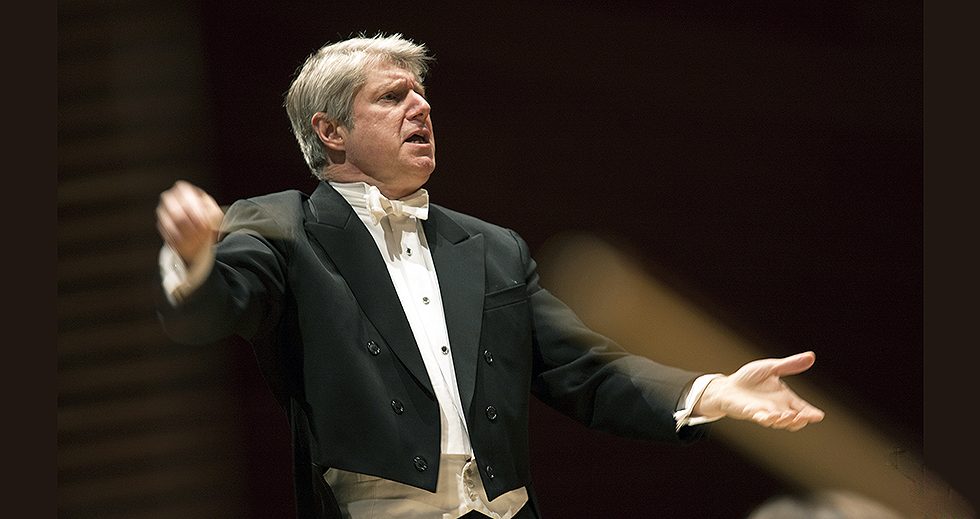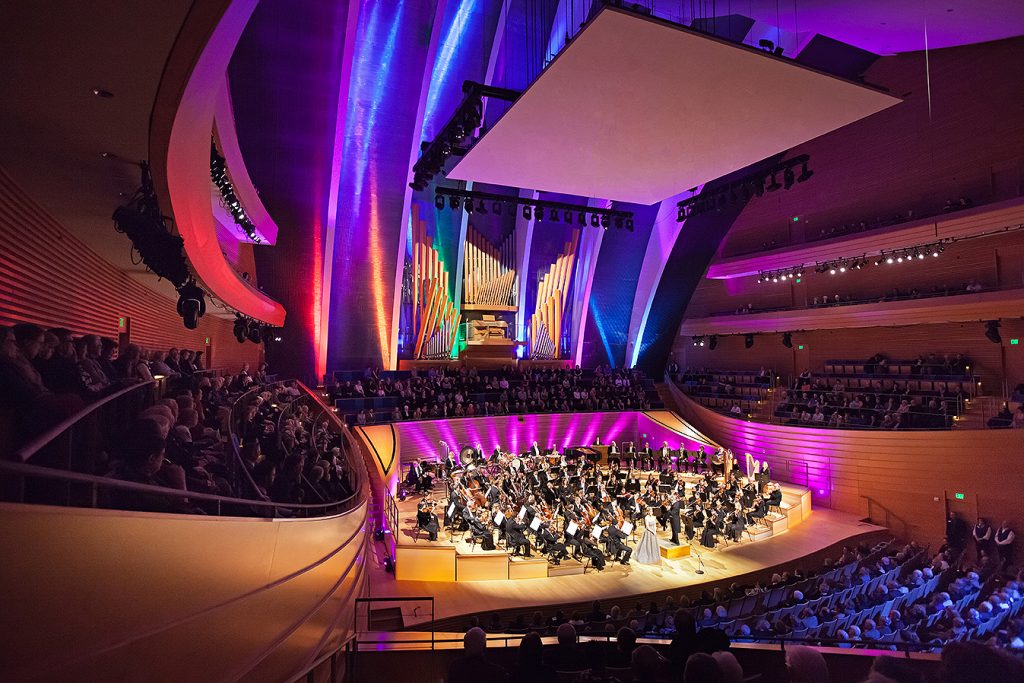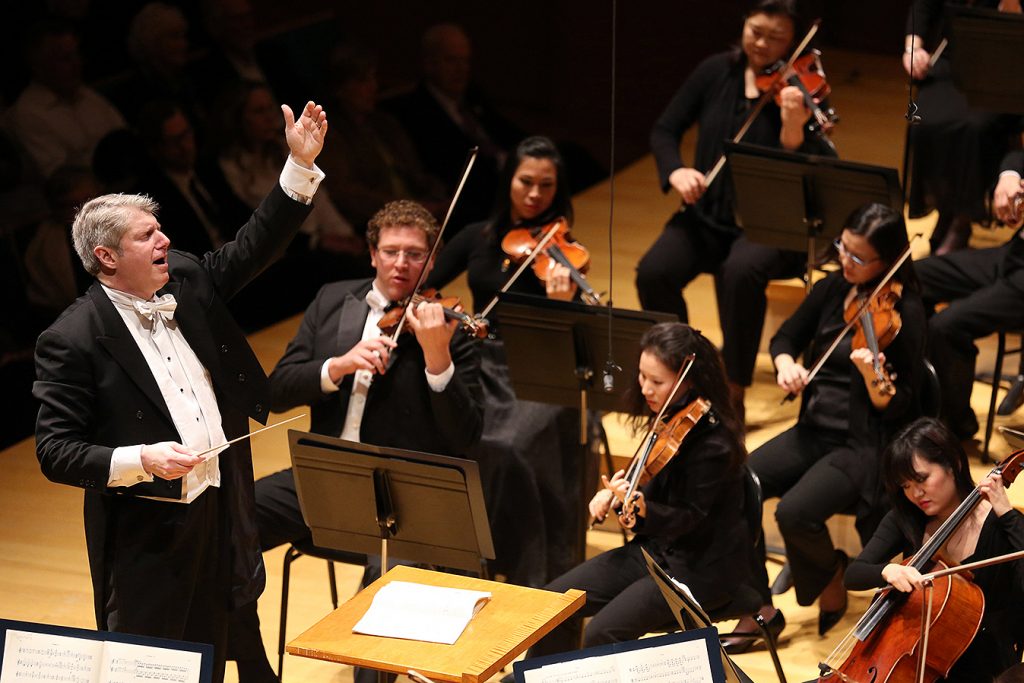
Michael Stern has devoted much of his conducting career to orchestras in two cities — Kansas City, Mo., and Germantown, Tenn. — that often get dismissed nationally as flyover country. But rather than feeling like some kind of an exile, he revels in his good fortune and touts the selling points of both places.
Stern, 58, who grew up in New York City and is the son of famed violinist Isaac Stern, admits that he had his doubts about both locales. Since becoming the founding artistic director and principal conductor of the IRIS Orchestra in Germantown in 2000 and taking over as music director of the Kansas City (Mo.) Symphony five years later, however, he boasts of the commitment to high-quality classical music that the two cities demonstrate.
“When something is transformed into something else, it’s hard not to get frustrated when people keep the old perception. All they have to do is come and visit the town,” he said of Kansas City, which he believes defies its cow-town stereotype in every way.
A guest conductor at some of the world’s top orchestras in North America, Europe and Asia, Stern will lead the Chicago Symphony Orchestra on Aug. 1 at the Ravinia Festival. In early July, he agreed to replace Gianandrea Noseda, after he had to cancel the Ravinia program due to surgery for a herniated disc.

The Kansas City Symphony celebrates the homecoming of Joyce DiDonato with performances conducted by music director Michael Stern at Kauffman Center for the Performing Arts. | Photo: ©Chris Lee
Stern’s musical foray into Middle America began at the invitation of Yo-Yo Ma, when the conductor led a Memphis Symphony concert featuring the famed cellist at the Germantown Performing Arts Center. It was a benefit for a new string program that the facility was inaugurating because orchestral music had recently been eliminated from the local school curriculum in the Memphis suburb.
While Stern was there, the executive director talked to him about a desire to have a resident orchestral ensemble at the arts center, something that the conductor saw as a pipe dream. “I will admit that in the back of my mind,” Stern said, “I thought: ‘What is this guy talking about? He wants a resident group in Memphis, Tenn.?’ All my New York sensibilities were like: ‘Oh, right, they want bluegrass and Elvis.’ ”
But he was impressed enough with the executive director’s vision that he agreed to help put together the resident ensemble if funding could be found. A year or two later, Stern got a call telling him that the Germantown city council had agreed to underwrite the ensemble for three years, an appropriation that was later extended until the orchestra was able to get on its feet as a self-supporting organization.
Because funding was tight and because Memphis already had a full-time symphony, Stern came up with the idea for a mid-sized orchestra that would draw its members from leading orchestras, universities and chamber ensembles from across the country and beyond. The resident group was dubbed the IRIS Orchestra, a name that refers to the dual meanings of “iris” as both the state flower of Tennessee and a part of the eye.
The draw for musicians would be the chance to experiment and perform adventuresome programs, all with a particular devotion to American music. In the years since, IRIS Orchestra has performed new works by such composers as William Bolcolm, Stephen Hartke, Adam Schoenberg and Ellen Taaffe Zwilich. In 2017-18, for instance, the orchestra’s season will include a March 10-11 program titled “America in Song.” It will celebrate the 100th anniversary of Leonard Bernstein’s birth with performances of his iconic ballet Fancy Free. Also featured will be Howard Hanson’s Symphony No. 2 (Romantic); Samuel Barber’s Knoxville: Summer 1915 and two songs by Josephine Baker, the American entertainer who spent most of her career in France and was a headliner in the early 20th-century at the Folies Bergère in Paris.
In addition, the group’s members take part in extensive outreach activities such as mentoring local music students, presenting an evening lecture series and performing lunchtime concerts on the local public radio station. “There is an incredible collaborative spirit with the audience and on stage,” Stern said. “In the best sense and in the least fake way to put it, it’s really a family.”
More than 50 IRIS members have played in the ensemble for more than 10 seasons. Some, who were students and up-and-coming professionals when they started, now hold positions with such prestigious orchestras as the Boston Symphony, Philadelphia Orchestra and even the Royal Concertgebouw Orchestra in the Netherlands. All of them arrange their schedules so that they can be in Germantown for the orchestra’s five sets of concerts each season.

Of the Kansas City Symphony, Michael Stern says, “We have a lot of benchmarks that make me incredibly proud.” | ©Todd Rosenberg Photography 2015
Stern’s experiences in Tennessee were repeated in some ways when he first conducted the Kansas City Symphony, substituting for its then-music director Anne Manson. He again had initial misgivings, and he acknowledges knowing so little about the city that he had to look on a map.
But his notions of the Midwestern metropolis changed quickly. “The minute I got there I realized there is something different in this town,” he said. “First of all, I found a willingness among the orchestra. And truth be told, the orchestra was not what it is today. We have worked hard to raise the standard. But even then, there was a really open quality to the rehearsals, which was immediately discernible.” In addition, volunteers and other residents spoke to Stern about their expectations for the city and its orchestra. “I was pretty floored right from the beginning,” he said.
Beyond the people who have spent their whole lives in Kansas City, he has since encountered two main types of residents: those who left and then returned a decade or two later to raise their families and those who were transplanted for a job or other reason, were going to stay only a year or two and are still there 30 years later.
“That means something because people are investing with a view toward the long haul,” he said. “And that makes a difference. And it certainly makes a difference when you’re talking about culture, because it allows us to invent a role for music — what the arts can mean for the community — in a way that is not dictated by the ups and downs of the economy or what the vagaries of one season or one political climate would be. It’s much more grounded in something real.”
Since Stern’s arrival in 2005, the Kansas City Symphony has steadily boosted its national standing by raising the level of playing, instituting diverse programming and attracting top-flight soloists. In addition, it moved into its new home, the Kauffman Center for the Performing Arts, in 2011. “We have a lot of benchmarks that make me incredibly proud,” he said. “We have changed the culture of the place, and that has been transformative, and it really makes a difference.” The orchestra just finished its sixth consecutive season with a budget surplus, and it announced in January that it had raised $52 million toward a goal of $55 million for its endowment fund — the largest such campaign in the organization’s history.
“Between the programming and the soloists who come, which I think can hold a candle to anywhere, we really are trying to make something really significant happen,” Stern said. “It fills me with gratitude to know that, in this day and age, music can matter the way it does in Kansas City.”
Kyle MacMillan, former classical music critic of the Denver Post, is a Chicago-based arts journalist.
TOP: Michael Stern, music director of the Kansas City Symphony, also leads the IRIS Orchestra of Germantown, Tenn. | Photo: David Bickley